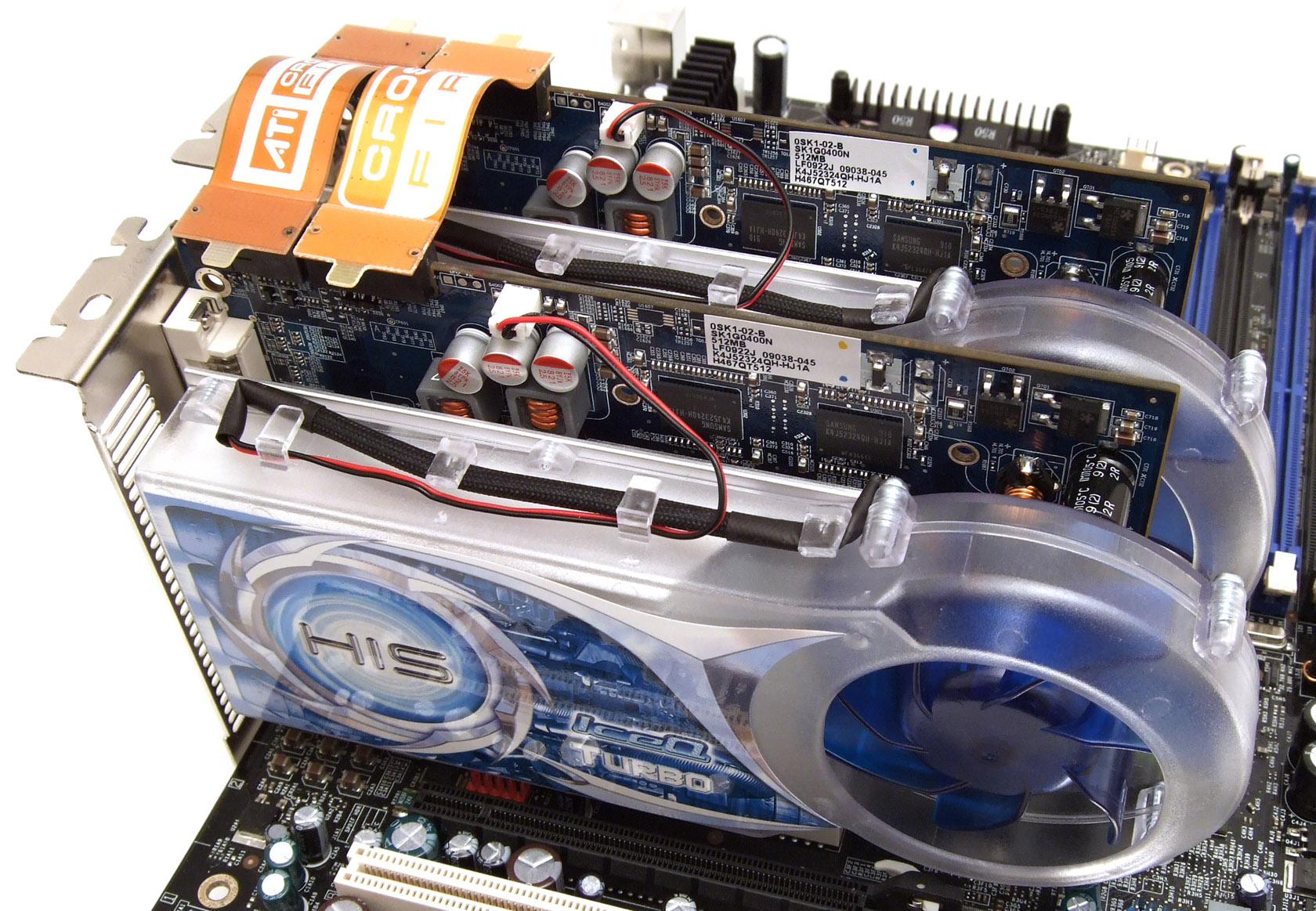Roundup: Mainstream Graphics Cards From ATI And Nvidia
HIS H467QT512P CrossFire (Radeon HD 4670, 2 x 512 MB, CF)
To see all the photos in our gallery for this card, click the image below.
Thanks to a dual delivery from HIS, we were also able to test performance with a pair of its IceQ-equipped Radeon HD 4670s, using two flexible bridge connectors to create a CrossFire configuration. Thanks to its dual-GPU horsepower , this configuration is actually able to compete against a Radeon HD 4850, GeForce 9800+ GTX, and GeForce GTS 250.
As mentioned, the GPU clock speed of each board is boosted slightly to 780 MHz instead of the reference 750 MHz setting, which increases the overall performance of a single card by 1.5%. The increase in benchmark scores in CrossFire is much more pronounced, as a second GPU boosts the numbers by nearly 90%. Nearly all games played through smoothly. It took applying 8x AA before the cards started to lag a bit. With Far Cry 2 at 1920x1200 and with 8x AA, the card could only crank out 17.2 FPS.
The prevailing prejudice against multiple graphics processors in a CrossFire configuration has been mitigated somewhat, thanks to improved support and optimization for ATI GPUs in more games and drivers. But the combination of two Radeon HD 4670 cards does enjoy a couple of advantages vis-à-vis dual-GPU cards or a giant high-performance graphics card—two Radeon HD 4670 cards remain very quiet at 37.3 dB(A) (even under heavy load), and when their ability to service the latest 3D engines falls behind, you’ll have two energy-efficient and quiet graphics cards that can make themselves comfortably at home in an office computer or a home-theater PC (HTPC).
The principle CrossFire card’s narrow profile is very handy because it is completely covered by the second card’s circuit board. The temperature does jump from 71° to 79° C in a dual-card configuration under heavy 3D load, but this remains within the comfort range for the cooling fan, which continues to operate at 30% of its full duty cycle, just as it does in single-card situations. The combination of the energy-efficient Radeon HD 4670 and the IceQ cooler from HIS is truly impressive, and even in a CrossFire configuration, it can still make excellent use of the capable fan and dedicated cooling channel. If you want to install a CrossFire rig, however, you must remember to purchase the CrossFire bridge connectors separately or make sure your motherboard comes with them, since HIS does not include them in the retail package.
Get Tom's Hardware's best news and in-depth reviews, straight to your inbox.
Current page: HIS H467QT512P CrossFire (Radeon HD 4670, 2 x 512 MB, CF)
Prev Page HIS H467QT512P (Radeon HD 4670, 512 MB) Next Page Sapphire HD 4770 512M (Radeon HD 4770, 512 MB)-
Bloodblender All I can say is that Tom's recent articles have been an excellent read, and this exactly the stuff I (as well as many others) require for their research purposes. Keep up the great work!Reply -
dirtmountain Nice article,very well done, but you need to show the 4670 in CF as costing $162, not $81 as shown in the final chart.Reply -
rambo117 the iceQ concept is amazing. keeps my 3870s nice and chilly (70C) while hardcore gamingReply
and not to mention they both look intimidating in my case ;) -
to me the gaming benches are most important but energy efficiency and heat dissipation run a close 2nd. thanks for providing it all!Reply
-
Julianbreaker Newegg has quite a few 4850s that retail for $100 and it appears to be getting consistently better benchmarks than the 4770. I am confused as to why you would not recommend it over the 4770. Perhaps you are confused by simple maths.Reply -
radiowars PijQuick question - 4770 in crossfire or single 4890 best bet???..They already did a whole article on that...Reply -
bucifer I don't understand why you still won't use the 1GB version of the Radeon 4870. It's clear to me that the card is limited by it's amount of video memory when using hi-res, AA and AF.Reply
Searching for prices in US and Europe it retails cheaper than the GTX260(192 or 216).
The point is: the card should be included in the test just as the GTX260-216. It's clearly a better option than the 512 mb version and it's good for comparison! -
holodust Nice article, but I don't see how testing these cards on i7 920@3.8 fits into mainstream.Reply
